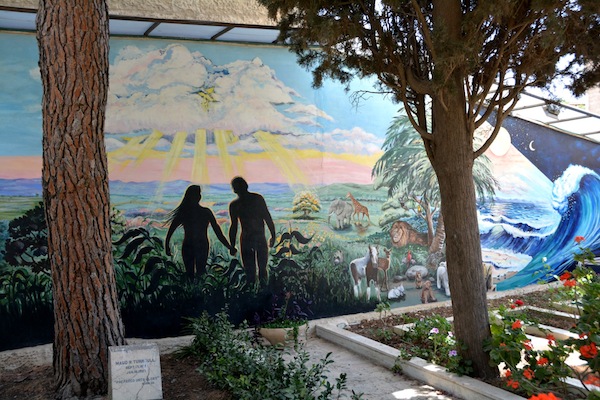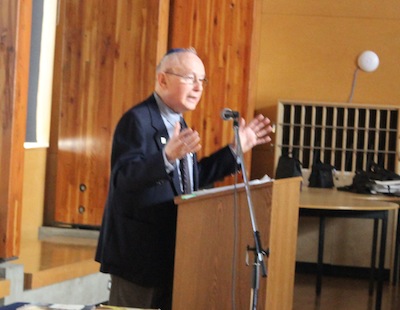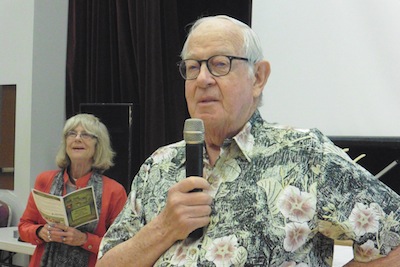Louis Brier Home and Hospital. (photo from cjnews.com)
“Louis Brier offers our residents variety in programming and services, as well as safe and quality care. Residents and families remain the primary decision-makers for the care received, as resident and family-centred care is at the core of our goals. All care is governed by our Jewish and professional values and standards of excellence,” Angela Millar told the Independent.
Millar is the director of quality and risk management, accreditation and resident experience for the Louis Brier Home and Hospital and Weinberg Residence. She was responding to questions from the Jewish Independent about the 2017 British Columbia Residential Care Facilities Quick Facts Directory, published by the Office of the Seniors Advocate (OSA). The directory “lists information for 292 publicly subsidized facilities in British Columbia that offer residential care services to seniors,” including Louis Brier.
The information was “gathered primarily from residential care facilities, health authorities, the Ministry of Health and the Canadian Institute for Health Information.” The data on licensing incidents and complaints is from the 2015-16 fiscal year, while the “inspection data was a snapshot taken on Dec. 7, 2016.” The 2017 OSA report can be found at seniorsadvocatebc.ca and the most recent inspection information from Vancouver Coastal Health at inspections.vcha.ca.
Millar explained, “Louis Brier is an affiliate of Vancouver Coastal Health, providing residential care for seniors. Vancouver Coastal Health provides an annual operating budget and Louis Brier Home and Hospital also receives donations from the Louis Brier Jewish Aged Foundation, which provides music and art therapy, Jewish culture and synagogue, kosher food and supplementation of medical equipment.”
The OSA directory mentions the Louis Brier Jewish Residence Society, as well as separate resident and family councils.
“The resident council represents the seniors who live at Louis Brier, ensuring they have a voice in how their home is run,” said Millar. “The council is supported by staff and meets monthly to discuss concerns, develop suggestions and plan activities. The executive director of resident care services and the chief executive officer attend meetings to provide updates, answer questions and develop plans to address concerns where needed.
“The family council is an independent group of family members and friends who meet monthly to support each other and advocate for the seniors residing at Louis Brier. A staff member liaises with the council and senior management team, who are often invited as guests. The family council acts as a forum to share experiences, learn and exchange information.”
In the 2017 OSA directory’s statistics on care services and quality, Louis Brier performed better than the B.C. average in percent of residents receiving physical therapy (34.3% versus 13.2%) and occupational therapy (10.3% versus 7.6%) but not in percent of patients receiving recreation therapy (1.1% versus 27.9%). With different percentages, Louis Brier fared similarly in the OSA’s 2016 report.
Noting that the data collected for the OSA report is “a snapshot at one time in a period,” Millar said, “I believe that the data is collected utilizing a seven-day observation tool throughout only one week in a quarter. Of course, my personal concerns are related to the validity and reliability of the data that is reported and thus the ability to generalize or glean valuable information from that data.
“My concerns aside, data collection is only looking at therapeutic interactions of the rehab team with residents – one PT/OT [physical or occupational therapist] per four residents and one rec therapist per eight residents – unfortunately rehab and rec resources [do] not abound, and our aim is to maximize the outcome and benefit to as many residents as possible given the resources that we have. As such, many of our programs and interventions are designed to accommodate larger groups of residents and most likely beyond the guidelines of the seniors advocate data collection parameters. It would help to understand how these parameters have been established and whether they have been evaluated for reliability in terms of producing valid data to help draw conclusions in relations to quality of care and residents’ outcomes.”
Millar emailed the home’s May recreation calendar, which can be found at louisbrier.com/events, “as an example of the plentiful and very rich programming that we are proud to provide our residents.”
In the 2017 directory, Louis Brier fares better than the provincial average in many areas: there were no substantiated licensing complaints and no reported incidents of disease outbreak or occurrence, abuse or neglect, food poisoning, medication errors or missing or wandering persons. With respect to falls with injury or adverse event, there were 5.1 per 100 beds, compared to a B.C. average of 11.9; and, in the category of other injury, 1.4 per 100 beds at Louis Brier compared to a provincial average of 1.6.
There is only one measure in which Louis Brier fared lower than the provincial average in the 2017 directory. In the year examined, there were nine reported incidents of aggression between persons in care at Louis Brier, or 4.2 per 100 beds, as compared to the provincial average of 1.5 per 100 beds; the 2016 OSA directory lists zero such incidents at the home.
With respect to four other quality measures, Louis Brier fared better or comparable to the provincial averages in three areas – percentages of residents diagnosed with depression, residents receiving depression medication and use of daily physical restraints. However, with respect to the percent taking antipsychotics without a diagnosis of psychosis, 40.8% of Louis Brier residents who were taking antipsychotic medications had not received a diagnosis of psychosis, compared with the B.C. average of 26.9% in the 2017 report, and 41% versus 31% in the 2016 report. As well, the OSA directory reports that, while 16.2% of Louis Brier residents had been diagnosed with depression, 48.1% of residents were receiving depression medication; in the 2016 directory, the respective figures were 21.1% diagnosed and 52.3% receiving depression medication.
“Your specific question with regards to prescription of specific treatments, medications and diagnoses is not something that can be responded to in a simple way…. While nursing staff are responsible to deliver care to the residents every day of the year, they, however, have limited control on what and how medications are prescribed and why,” said Millar. “Nurses advocate on behalf of the residents and may raise questions and awareness, however, changing physician practice or implementing best practices as it is related to the medical field and residential care are an entirely different area for discussion and attention. To understand and evaluate whether medications and treatment are prescribed appropriately requires a comprehensive approach by both the nursing and medical staff. We are certainly committed to ensure our residents receive safe, quality care and are continually monitoring medications and treatments as possible.”
Millar explained, “Louis Brier is regulated by the Community Care and Assisted Living Act, as well as the Hospital Act, which is enforced by Community Care Facilities Licensing.
“Currently the facility is showing its commitment to quality care by preparing for an Accreditation Canada Survey in May of 2018. Accreditation Canada will assess our organization against standards of excellence with regards to leadership, long-term care, medication management, infection control and governance.”
She described Accreditation Canada as “a significant wealth of information and resource for organizations in their quest to improve and achieve the highest level of care and quality possible within the industry” and invited the Independent and its readers to the Louis Brier Accreditation Fair on May 23 “to learn more and see how you can get involved.”
Millar noted that Louis Brier also has “just developed a quality and risk portfolio including a director of quality and risk management [QRM], manager of QRM, an infection control practitioner, as well as a QRM coordinator. Within this team, there are also individuals responsible for resident experience, including social work, volunteer coordinator and the manager of the companion program.”
As for staffing levels overall, Millar said, “I believe that there could never be enough staff and resources; however, we do have to work within our funding boundaries, given what we have. We can say with great confidence that Louis Brier has, most likely, more resources in terms of rehab and recreation staff than many other organizations (mainly because we are so greatly supported by the Louis Brier Foundation): we have over 300 volunteers and over 100 companions that help us deliver outstanding care to all of our residents. To that end, Louis Brier shares a common goal with the seniors advocate – of providing safe, quality care to our elders. Furthermore, Louis Brier certainly supports the efforts and intention of the seniors advocate in evaluating and advocating for additional resources to be allocated to the long-term care sector to help providers support and deliver excellent care to our seniors.”
















